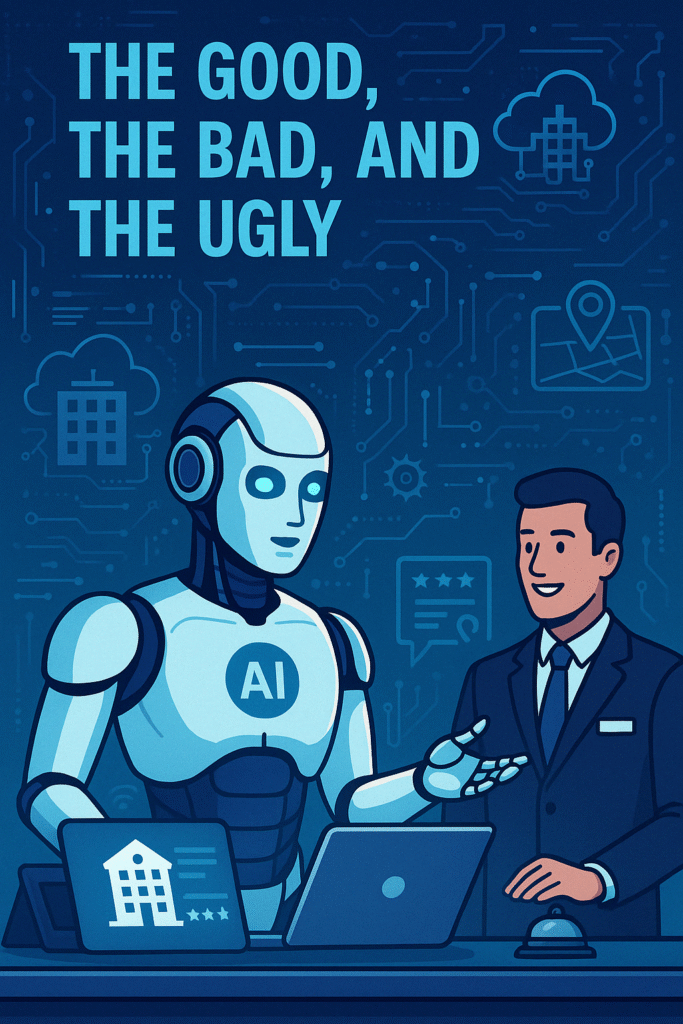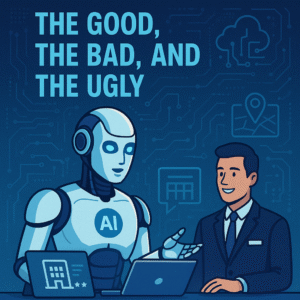The Good: AI That Actually Transforms Travel Tech
Genuine AI, when properly implemented, can revolutionize hospitality and travel technology. AI-driven dynamic pricing engines, intelligent guest personalization, and predictive maintenance are just a few examples of how machine learning can create significant efficiencies and improve the guest experience.
Take Hopper, for instance. This AI-driven travel app predicts flight and hotel prices with remarkable accuracy, using vast datasets and machine learning models to help travelers book at the optimal moment. Meanwhile, OTA Insight provides AI-powered revenue and distribution management solutions that help hoteliers stay ahead in competitive markets.
In the property management system (PMS) and channel management space, Mews has emerged as a leader in AI-driven automation, streamlining booking processes, payments, and guest interactions through intelligent workflows. Cloudbeds is another strong player embedding AI into their PMS platform to automate tasks, recommend pricing strategies, and provide real-time operational insights.
Revenue optimization platforms like Duetto leverage AI to fine-tune pricing and forecasting in real time, delivering high-performance tools to hotel revenue teams. Meanwhile, platforms such as Turbosuite and PriceLabs bring advanced AI-powered pricing intelligence to the table, helping properties of all sizes set optimized rates based on demand patterns, seasonality, and competitor benchmarks. Both connect with a wide range of PMSs, including Cloudbeds, Mews, and Minihotel.
These companies don’t just slap “AI” onto their branding; they invest in deep-tech machine learning models that learn, adapt, and deliver measurable results.
The Bad: AI That’s Just a Pretty Wrapper
While some companies use AI to create real value, others use it merely as a buzzword. Many travel tech platforms claim to have “AI-powered” analytics, but a closer look often reveals that they are merely repackaging third-party APIs or using simple rule-based automation—nothing that truly qualifies as AI.
For example, some PMS providers boast about AI-driven customer insights, yet their platforms only pull basic guest segmentation data from external analytics providers. Similarly, certain channel managers claim to use AI for distribution optimization, but in reality, they are just tweaking pre-defined rules based on static historical data rather than employing true predictive modeling.
A telltale sign of fake AI is the lack of explanation on how it actually works. If a company cannot clearly articulate what their AI does beyond vague terms like “smart insights” or “intelligent automation,” it’s likely smoke and mirrors.
The Ugly: When AI Is Just Hot Air
Then there’s the outright deception—the ugly side of AI in travel tech. These are the companies that make grand AI claims without any real technological foundation to support them. The worst offenders simply integrate third-party APIs (often from providers like OpenAI or Google) and rebrand them as their own proprietary AI.
For instance, a company might add an AI chatbot powered by a generic third-party language model and claim to have built a revolutionary AI concierge. In reality, it’s the same API that any company could implement in a matter of hours. Other companies slap AI on their revenue management solutions but are actually using static, predefined pricing rules rather than true machine learning models.
This kind of AI-washing not only misleads customers but also dilutes the industry’s progress. Hoteliers who invest in these so-called AI solutions may end up disappointed and skeptical about AI’s true potential, making it harder for legitimate innovations to gain trust and traction.
How to Recognize True AI from Fake AI
So how can hoteliers and travel tech buyers differentiate between real AI and mere marketing fluff? Here are a few key questions to ask:
- What kind of machine learning is being used? True AI involves self-learning algorithms that improve over time, not just pre-set rules or scripts.
- Does the system adapt based on new data? Real AI-driven systems continuously analyze and adjust based on real-time inputs.
- Can the company explain the AI’s workings in a clear, non-generic way? If all you hear is “we use AI to optimize your business” without specifics, be skeptical.
- Is the AI proprietary or just a third-party API? Ask whether the company developed its own AI models or relies on external AI services.
- Are there real-world success stories? Genuine AI companies can demonstrate measurable improvements in revenue, efficiency, or customer experience.
The Future of AI in Travel Tech
Despite the industry’s struggles with AI hype, the future remains bright for companies investing in genuine, deep-tech solutions. As machine learning models become more sophisticated and data collection improves, AI has the potential to transform everything from guest interactions to back-office operations.
For those looking to invest in AI-driven travel tech, the key is to look past the marketing buzz and focus on substance. Companies like Hopper, Mews, Cloudbeds, Duetto, OTA Insight, Turbosuite, and PriceLabs are leading the way, but many others are just riding the AI wave without true innovation. By being discerning and asking the right questions, hoteliers and travel businesses can ensure they invest in technology that delivers real, measurable results—not just another fancy label.
AI in travel tech has incredible potential—but only when done right. The challenge for hoteliers and travel operators is to separate the real game-changers from the smoke and mirrors. And for those companies pushing hollow AI claims? It’s only a matter of time before the market sees through the facade.



